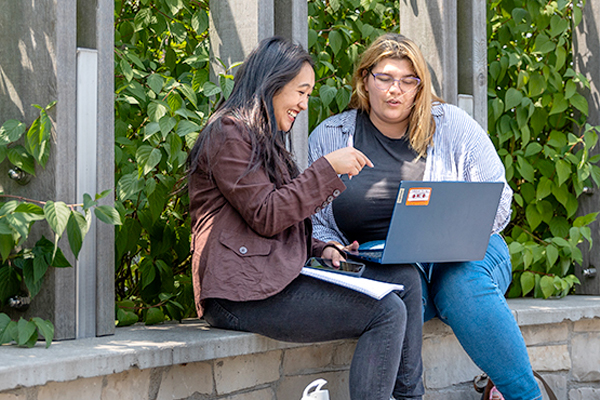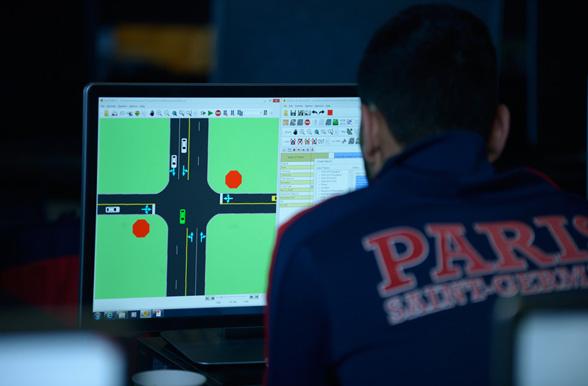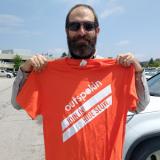Civil Engineering Technology - Transportation
- 524
Program Highlights
- Mohawk is the only college in Canada providing this highly specialized training in transportation engineering technology. Graduates are working across the country in planning, design and operations positions and have excellent opportunities for career advancement within this unique engineering field.
What you'll learn
- Understand transportation networks, public transportation systems, walking and cycling infrastructure and their roles in society.
- Develop planning skills to make decisions about present and future mobility needs.
- Apply current standards and practices to design roadways, intersections and other transportation facilities with safety as a key consideration.
- Acquire surveying, CAD, plan reading and visualization skills needed to create today’s modern infrastructure.
- Explore traffic data collection methods, traffic control devices and management strategies.
- Analyze operational performance, capacity and level of service (LOS) on streets, highways, public and transportation infrastructure, and walking and cycling infrastructure.
This program was previously known as Transportation Engineering Technology (543).
Program Length
3 academic years (periods of 8 months), plus co-op
Course Overview & Descriptions
Click on the course title for a course description.
Learning Outcomes
Program Learning Outcomes, often referred to as ‘Program Standards', set out the essential learning that a student must achieve before being deemed ready to graduate.
In many cases these program learning outcomes were developed by the Ministry of Colleges and Universities (MCU) in consultation with employers and educators who are experts in the program field. To ensure the outcomes remain current and in line with industry needs, we invite our employers, graduates working in the field and current students to re-examine and update them during regular, ongoing program review focus groups.
Admission
Domestic and International student admission requirements
OSSD or equivalent (Mohawk Academic Upgrading, GED) including:
- Grade 12 English, C or U or equivalent
- Grade 12 Mathematics (C* or U) or Grade 11 Functions (MCR3U)
* students with MAP4C require a grade ≥ 60% in the course
Applicants whose first language is not English will be required to demonstrate proficiency in English.
Options are available for mature applicants.
Don't have the necessary requirements?
Language Requirements for Applicants with English as a Second Language
- See below for accepted equivalents for Grade 12 English:
- Successful completion of the GAS-English for Academic Purposes (478) program
- TOEFL minimum score of 550 (80 Internet based)
- or IELTS Academic minimum score of 6.0 overall with no band less than 5.5
- More information about acceptable certificates, can be found on the International Admission Requirements
Tuition and Fees
2024 - 2025 Domestic Tuition and Fees
| Description | Semester 1 | Semester 2 |
|---|---|---|
| Compulsory Ancillary Fees | $881.96 | $785.16 |
| Co-op Fees | $257.14 | $235.71 |
| Compulsory Program Fees | $0.00 | $0.00 |
| Domestic Tuition | $1,354.04 | $1,354.04 |
| Total Domestic Charges Per Semester | $2,493.14 | $2,374.91 |
| Total 1st Year Fees | $4,868.05 | |
Above fees based on full-time September program start date. Contact Student Services to confirm fees for other start dates or semesters.
- Full Cost Breakdown
- Explore payment options
- Book costs for your program can be found through the Campus Store
- You will also be required to purchase a laptop (or personal computer, where deemed appropriate). Additional program-specific software and hardware may also be required. Full details will be provided in your classes or at your orientation. This is an additional cost (above tuition/ ancillary fees and textbooks).
- You will also be required to purchase safety equipment, tools/supplies and/or exam fees. Full details will be provided in your classes or at your orientation. This is an additional cost (above tuition/ancillary fees and textbooks).
2024 - 2025 International Tuition and Fees
| Description | Semester 1 | Semester 2 |
|---|---|---|
| Total Tuition & Ancillary Fee | $8,525.00 | $8,525.00 |
| Co-op Fees | $257.14 | $235.71 |
| Program Compulsory Fees | $0.00 | $0.00 |
| International Tax Recovery | $450.00 | $375.00 |
| Total International Per Semester | $9,232.14 | $9,135.71 |
| Total 1st Year Fees | $18,367.85 | |
If you pay by wire transfer, please note your bank might charge you a fee to transfer money. Make sure your transfer includes the Mohawk payment and the wire transfer fee. This applies to each wire transfer payment you make.
- Explore payment options
- Book costs for your program can be found through the Campus Store
- You will also be required to purchase a laptop (or personal computer, where deemed appropriate). Additional program-specific software and hardware may also be required. Full details will be provided in your classes or at your orientation. This is an additional cost (above tuition/ ancillary fees and textbooks).
- You will also be required to purchase safety equipment, tools/supplies and/or exam fees. Full details will be provided in your classes or at your orientation. This is an additional cost (above tuition/ancillary fees and textbooks).
Additional Information
Financial Assistance
When it comes to paying for your education, investing in your future can be more affordable than you think. A Mohawk education is one of the most cost-effective means of acquiring the skills and knowledge you need to have a prosperous and rewarding career.
As you start on your chosen career path, it's important to have a realistic set of expectations regarding the expenses associated with attending college. In addition to your tuition fees, you will also need to budget for books, supplies, housing, and other related living expenses. You may be able to supplement your income and savings with scholarships, bursaries, or loans. It pays to do some research into what types of financial assistance you may qualify for.
Available Financial Assistance Resources:
 OSAP Eligible. Learn about Ontario Student Assistance Program - OSAP (domestic students only)
OSAP Eligible. Learn about Ontario Student Assistance Program - OSAP (domestic students only)- Working on Campus
- Additional Sources of Funding
- Financial Assistance Home Page
Apply for Awards:
By submitting a Scholarships and Bursaries Application every semester, students have access to over $3 million in Mohawk College scholarships, bursaries and Ministry-partnered funding to help meet their financial needs.
Financial Literacy:
Whether saving for school, sticking to a budget, or planning for a major purchase, financial literacy affects us all. That's why Mohawk College is dedicated to helping students improve their financial literacy and become more confident in managing their money.
- Complete the free online Money Matters Module to earn Co-Curricular Credit!
- Financial Resources and Calculators
Experiential Learning
How you’ll gain skills
- Solve a challenge by applying knowledge and skills acquired throughout the program through a capstone project.
- Test and apply course concepts through current software in our computer labs.
- Gain valuable experience during co-op work terms.
This co-op program has been accredited by CEWIL Canada. This represents the highest standard of achievement for co-op programs in Canada.
To learn more, please visit the Centre for Experiential Learning.
Co-op Format
| September to December | January to April | May to August |
|---|---|---|
| Semester 1 | Semester 2 | Vacation |
| Semester 3 | Work Term 1 (Co-op) | Semester 4 |
| Work Term 2 (Co-op) | Semester 5 | Work Term 3 (Co-op) |
| Semester 6 |
OR
| September to December | January to April | May to August |
|---|---|---|
| N/A | Semester 1 | Semester 2 |
| Semester 3 | Work Term 1 (Co-op) | Semester 4 |
| Work Term 2 (Co-op) | Semester 5 | Work Term 3 (Co-op) |
| Semester 6 |
Learn more about Civil Engineering Technology - Transportation
Co-op Delivery and Fees
This program has a mandatory co-op, as part of the program of study. The annual co-op fee structure can be found on the Tuition and Fees page.
For questions, please contact the Co-op Specialist listed at the bottom of the webpage.
Driver’s License and Vehicle
Please note that the majority of co-op positions for this program require that students have a valid driver’s license ('G' class preferred) and access to a vehicle.
Co-op Work Term Locations
Please note that co-op work terms for Civil Engineering Technology - Transportation are typically in-person and/or hybrid and require extensive field work.
Co-op Designation
This program offers three co-op work term opportunities but requires two completed co-op work terms for the co-op designation.
Work Term Capabilities
(which do not reflect individual work experiences & exposures)
The student having completed three full semesters of study (typically in time for a Winter co-op) will have sufficient knowledge to perform the following tasks:
- Organize, conduct and analyze traffic field studies
- Prepare a signage and pavement marking plan in accordance with local guidelines (typically the Ontario Traffic Manual)
- Research various sources of information and prepare detailed inventories in the form of maps, charts, graphs and spreadsheets
- Undertake analyses of information such as capacity of uninterrupted flow facilities, parking activities, and public transit operations on a limited basis
- Produce a simple roadway geometric design task
- Evaluate transit planning decisions in relation to bus stops and network design
Having completed four full semesters of the including work experience program, (typically in time for a Fall co-op) gained in the first work term, the student will now be capable of undertaking more extensive assignments:
- Undertake analyses of information such as capacity of interrupted flow facilities and traffic/site impact studies using leading industry software (Synchro and InterCalc)
- Design pedestrian and cycling facilities in accordance with local guidelines (Ontario Traffic Manual and the Transportation Association of Canada Geometric Design Guide for Canadian Roads)
- Interpret the Ontario Planning Act as related to transportation engineering technology
- Undertake a roadway geometric design task in computer-aided drafting (CAD) software
- Understand the basics of construction management to initiate a simple project
- Prepare reports of a minor nature presenting a problem, alternative solutions, and recommended course action
After completing five full semesters of the program, (typically in time for a Summer co-op), the student will have acquired sufficient knowledge and specialized skill to perform the following activities:
- Perform a functional design of an intersection and a roundabout
- Undertake analysis of traffic signal progression along an arterial corridor using traffic capacity analysis software (Synchro or Vistro)
- Interpret the classic four-stage transportation planning model as applied to long-range transportation modelling
- Determine the transportation impacts of a proposed development; write a report documenting the findings and suggesting remedial measures to avoid degradation in the level of service
- Perform limited GIS queries and analysis
- Research a technical transportation topic and make a confident oral presentation in front of a large audience
| Co-op Pay Range | Co-op Pay Average |
|---|---|
| Range: $19.00 - $29.00 | Average: $23.00 |
For further information, please contact:
Karen Brown, Co-op Specialist
Phone: 905-575-2161
Email: karen.brown [at] mohawkcollege.ca (Karen Brown)
Educational Pathways
Pathways to Mohawk
If you've successfully taken a course at another post-secondary institution, you may be able to earn course exemptions toward your credential here at Mohawk.
Common Core
If you have successfully completed one of the following programs at Mohawk, you may be eligible to receive transfer credit in this program. *
- Architectural Technician (Enter Semester 2)
- Civil Engineering Technician (Enter Semester 2)
- Construction Engineering Technician
- Urban and Regional Planning Technician - Geographic Information Systems
- Civil Engineering Technology (Enter Semester 3)
- Architectural Technology (Enter Semester 3)
We offer a diverse range of programs to further your studies within Mohawk following completion of this program. *
- Architectural Technician (Enter Semester 2)
- Civil Engineering Technician (Semester 2)
- Civil Engineering Technology (Enter Semester 3)
- Architectural Technology (Enter Semester 3)
- Business Analysis
If you have successfully completed one of the following programs at Mohawk, you may be eligible to receive transfer credit in this program. To start a new program at Mohawk, you must apply via ontariocolleges.ca.
Transfer from
You can transfer to the Civil Engineering Technology - Transportation - 524 from the following programs:
Architectural Technician
Architectural Technology
Civil Engineering Technician
Civil Engineering Technology
Construction Engineering Technician
Pre-Technology
Urban and Regional Planning Technician - Geographic Information Systems (GIS)
Receiving Program
Civil Engineering Technology - Transportation
Transfer to
You can transfer from the Civil Engineering Technology - Transportation - 524 to the following programs:
Architectural Technician
Architectural Technology
Business Analysis
Civil Engineering Technician
Civil Engineering Technology
Credit transfer agreements have been arranged to make it easier for students to move from Mohawk to another institution.
Transfer From Civil Engineering Technology - Transportation To
Athabasca University
1 University Dr
Athabasca AB T9S 3A3
Canada
Bachelor of Science - PD
Bachelor of Science - PD with Majors:
- Applied Mathematics
- Computing Information Systems
- Human Science
1 University Dr
Athabasca AB T9S 3A3
Canada
Athabasca University
1 University Dr
Athabasca AB T9S 3A3
Canada
Bachelor of Professional Arts in Human Services
1 University Dr
Athabasca AB T9S 3A3
Canada
Mohawk College makes every effort to ensure the accuracy of each transfer opportunity. Please note that changes may occur in program offerings, admission requirements, and transfer credits granted by the receiving institutions. We advise all students to check with the receiving institution directly for the most up-to-date information.
Don’t see what you’re looking for? Search ONTransfer.ca for more pathways with Ontario public colleges and universities.
Mohawk College makes no warranty or endorsement of material contained within links to external websites, nor does the College assume any responsibility for the linked website or its contents.
Tech requirements
Technology Requirements
Software
AutoCAD is required for this program. A free download for students is available through the AutoCAD website. To be eligible for this download you must register with your Mohawk email, pass the system requirements test, and provide proof of enrollment (Photo of ONE Card, letter of acceptance, etc.). Note that you can only complete this registration process after your program start date.
Hardware
The Engineering programs recommend the "Best Specifications" as listed on the Student Tech Support Hardware Specifications page.
Note: We do not recommend using a Mac as the software required in this program has many usability issues with their operating system.
Career Opportunities
Your future career options
- Construction Supervisors
- Construction Estimator
- Civil Engineering Technologists
- Municipal
- Structural
- Geotechnical
- Environmental
- Transportation
- Material Testing and Design
- Surveying Technologists
- Project Managers
Where you could work includes:
- Public and Private Sectors
- Engineering Consulting
- General Contracting
- Construction Companies
Opportunities for grads
- Graduates may be eligible to be registered as associate members of The Ontario Association of Certified Engineering Technicians and Technologists (OACETT).
Affiliations
- Ontario Association of Certified Engineering Technicians and Technologists (OACETT), Transportation Association of Canada (TAC) and the Ontario Good Roads Association (OGRA).
Ready to apply?
If you are a Domestic or Canadian applicant, you can apply through the Ontario College Application System.
You are considered a Domestic applicant if you are a Canadian citizen or a permanent resident that resides inside or outside of Canada.

Contact us
Domestic Canadian Students
Contact Student Recruitment
Haven’t applied yet and have questions?
Contact our Student Recruitment team for information on programs, how to apply, and more.
Contact Admissions
Contact our Admissions advisors for help with your application.
Email Admissions
Book an Appointment ⤻
Phone: 905-575-1212
International Students
Contact International Student Recruitment
Contact our International Student Recruitment team for information on programs, how to apply, and student life.
Contact International
Email: intl.representatives@mohawkcollege.ca
Phone: 1-905-575-2254
Toll free phone numbers:
For general questions: 1-888-Mohawk9 (1-888-664-2959)
Contact International Admissions
Contact our Admissions advisors for help with your application.
Contact International Admissions
Phone: 1-905-575-2254
*Not all programs are international eligible. Please see our programs available for international students.
Program Coordinator

Craig Sherwood
Accessible Learning Services
Are you a student with a confirmed or suspected disability? Visit our Accessible Learning Services website to discover how we can help you.






